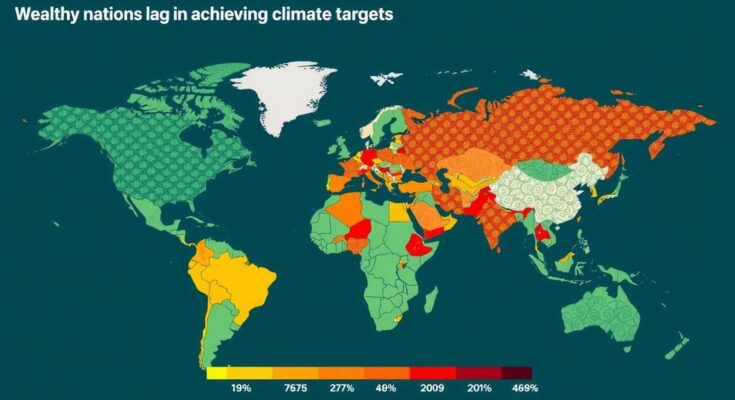A recent ASCOR study reveals that wealthy nations are failing to meet essential climate targets, as only a minority halt new fossil fuel projects and many lack transparency in climate financing. While countries like Costa Rica and Angola show promise, the wider landscape reflects persistent disengagement from global climate responsibilities, posing risks to both environmental health and economic stability.
A recent study by the Assessing Sovereign Climate-related Opportunities and Risks (ASCOR) Project indicates that affluent nations are failing to meet climate targets necessary to achieve a sustainable future. This study, which reviewed the emissions policies of 70 countries, highlights a concerning disengagement of wealthy countries regarding their commitments to reducing emissions and addressing climate change impacts. With global temperatures approaching the critical threshold of 1.5 degrees Celsius above pre-industrial levels less than 20% of nations have halted new fossil fuel developments, and over 80% lack transparent fossil-fuel subsidy phase-out commitments, illustrating a significant gap in climate action. The time-sensitive nature of climate threats underscores the need for robust governmental policies to reassure investors, who express skepticism about the adequacy of market responses to such risks. Although there are notable exceptions where countries like Costa Rica and Angola are making commendable strides toward meeting climate goals, significant challenges remain in the collective efforts of wealthier nations.
The urgency for action is heightened as the World Meteorological Organization has indicated that 2024 is poised to become the hottest year on record, reaching an alarming 1.5 degrees Celsius increase. Victoria Barron, Co-Chair of ASCOR and Chief Sustainability Officer at GIB Asset Management, emphasized that “Investors need to see more credible action by governments.” The implications of climate change extend beyond environmental impact to economic stability, as emerging research refers to a potential “climate-sovereign debt doom loop,” anticipating increased costs and risks associated with national debts due to climate impacts. The study’s findings are timely, coinciding with legal challenges faced by countries accused of neglecting to protect citizens from climate-related catastrophes like floods and fires. Meanwhile, the situation remains precarious in the United States, particularly with political changes that threaten commitments to international climate agreements.
Despite these setbacks, there is hope as legal frameworks for addressing climate change are being established in 40 countries, with a majority developing plans for managing the physical risks associated with climate impacts. However, the overall trend indicates that wealthy nations are lagging behind in their climate commitments, as demonstrated by the staggering fact that over 80% are not meeting their fair share of a pledged annual $100 billion international climate finance goal, which is set to escalate to $300 billion at the upcoming COP29 summit.
The ongoing discussion surrounding climate change emphasizes the urgent need for effective international cooperation, particularly among wealthy nations, as they possess the resources and capacity to lead in climate initiatives. Recent findings from ASCOR shed light on a disheartening trend, highlighting that affluent countries are not adequately contributing to emission reductions, which are critical for maintaining global temperature increases below 1.5 degrees Celsius. This dialogue is increasingly relevant as global temperature records continue to rise, and investors are becoming more acutely aware of climate-related risks within financial markets. As the climate crisis deepens, understanding the commitments and actions—or lack thereof—of wealthy nations is imperative for developing effective strategies moving forward.
In conclusion, the findings of the ASCOR study reveal that wealthy countries are significantly lagging in their efforts to meet climate goals essential for mitigating global warming. The lack of substantial commitments to phase out fossil fuels combined with insufficient climate financing amplifies the risks associated with climate change. With pressing evidence indicating severe climate consequences on the horizon, there is an evident necessity for governments to implement robust and transparent climate policies. While progress is being made in some countries, the overall trend reflects a concerning disengagement from global climate commitments, both politically and economically, necessitating immediate action.
Original Source: www.outlookbusiness.com




